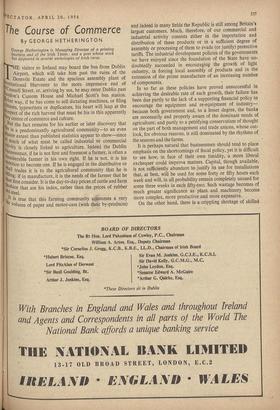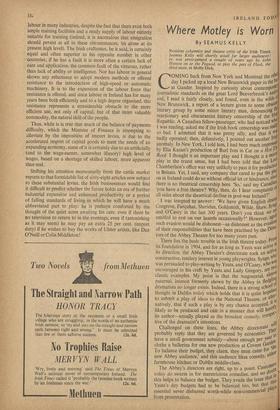The Course of Commerce
By GEORGE HETHERINGTON
George Hetherington is Managing Director of a printing business and of the Irish Times : and a poet whose work has appeared in several anthologies of Irish verse.
HE visitor to Ireland may board the bus from Dublin Airport, which will take him past the ruins of the Domvile Estate and the spacious assembly plant of ternational Harvester to the more impressive end of Connell Street, or, arriving by sea, he may enter Dublin past a? dOn'S Custom House and Michael Scott's bus station. pi fner way, if he has come to sell dictating machines, or tiling , °inets, typewriters or duplicators, his heart will leap at the boSpect of the rich harvest that must be his in this apparently IlsY centre of commerce and culture. 4ut the fact remains for his earlier or later discovery that s is a predominantly agricultural community—to an even dater extent than published statistics appear to show—since c) Much of what must be called industrial or commercial 6ivitY is closely linked to agriculture. Indeed the Dublin ?sinessman, if he is not first and foremost a farmer, is often a nsiderable farmer in his own right. If he is not, it is his tail to become one. If he is engaged in the distributive or `itteail trades it is to the agricultural community that he is must if in manufacture, it is the needs of the farmer that he '"h.ust first consider. It is the day-to-day prices of cattle and farm ,,,PNlice that are his index, rather than the prices of rubber ""ci steel, It is true that tng consumes a very fair volume of paperhis farming and motor-carscommunity (with their by-products) and indeed in many fields the Republic is still among Britain's largest customers. Much, therefore, of our commercial and industrial activity consists either in the importation and distribution of these products or in a sufficient degree of assembly or processing of them to evade (or justify) protective tariffs. The industrial development policies of the governments we have enjoyed since the foundation of the State have un- doubtedly succeeded in encouraging the growth of light industry, in forcing local assembly of products and in the extension of the prime manufacture of an increasing number of components.
In so far as these policies have proved unsuccessful in achieving the desirable rate of such growth, their failure has been due partly to the lack of a supporting financial policy to encourage the equipment and re-equipment of industry— because both government and, to a lesser degree, the banks are necessarily and properly aware of the dominant needs of agriculture; and partly to a petrifying conservatism of thought on the part of both management and trade unions, whose out- look, for obvious reasons, is still dominated by the rhythms of the seasons and the farms.
It is perhaps natural that businessmen should tend to place emphasis on the shortcomings of fiscal policy, yet it is difficult to see how, in face of their own timidity, a more liberal exchequer could improve matters. Capital, though available, is not sufficiently abundant to justify its use for installations that, at best, will be used for some forty or fifty hours each week and will, in all probability remain completely unused for some three weeks in each fifty-two. Such wastage becomes of much greater significance as plant and machinery become more complex, more productive and more expensive.
On the other hand, there is a crippling shortage of skilled labour in many industries, despite the fact that there exist both ample training facilities and a ready supply of labour entirely suitable for training (indeed, it is anomalous that emigration should persist at all in these circumstances. let alone at its present high level). The Irish craftsman, be it said, is certainly equal and often superior to his opposite number in other countries; if he has a fault it is more often a certain lack of care and application, the common fault of the virtuoso, rather than lack of ability or intelligence. Nor has labour in general shown any reluctance to adopt modern methods or offered resistance to the introduction of high-speed or automatic machinery. It is to the expansion of the labour force that resistance is offered, and since labour in Ireland has for many years been both efficiently and to a high degree organised, this resistance represents a considerable obstacle to the more efficient use, not only of capital. but of that more valuable commodity, the natural skill of the people.
Thus, while is is true that much of the balance of payments difficulty, which the Minister of Finance is attempting to alleviate by the imposition of import levies, is due to the accelerated import of capital goods to meet the needs of an expanding economy, some of it is certainly due to an artificially (and to the wage-earner, somewhat illusory) high level of wages, based on a shortage of skilled labour, more apparent than real.
Shifting his attention momentarily from the cattle market reports to that formidable list of sixty-eight articles now subject to these substantial levies, the Irish businessman would find it difficult to predict whether the future holds an era of further industrial expansion and enhanced productivity or a period of falling standards of living, in which he will have a much abbreviated part to play; he is perhaps comforted by the thought of the quiet acres awaiting his care, even if there be no television to return to in the evenings, even if (astonishing as it may seem) he may pay an extra 25 per cent. (import duty) if he wishes to buy the works of Ulster artists, like Dan O'Neill or Colin Middleton !



















































 Previous page
Previous page